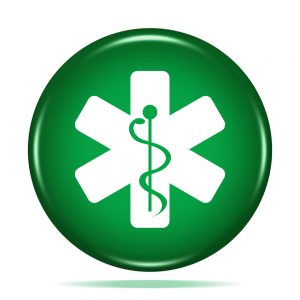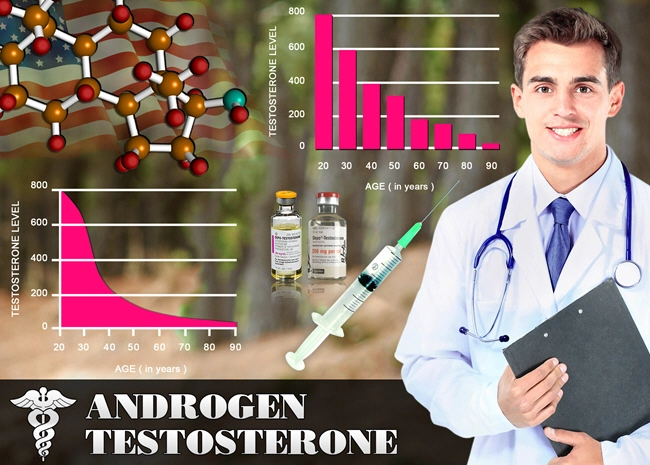
Video Link: https://vimeo.com/286620998
Video Download: Click Here To Download Video
Video Stream: Click Here To Stream Video
Unless you've been on a spaceship to Mars or crossing the Pacific Ocean on a small sailboat, you’ve probably heard the term “Low-T” or seen an advertisement talking about how testosterone declines as  men age and how the solution is undergoing testosterone replacement therapy (TRT).
men age and how the solution is undergoing testosterone replacement therapy (TRT).
It promises an incredible allure: increased libido, more muscle mass and strength, exploding energy levels to what they were in your youth, and a host of others.
But is that the entire story? Does it come with health risks?
Each birthday after 30 means a drop in testosterone levels by approximately 1%, and therefore 10% each decade.
Do the math.
By age 60 your testosterone levels will be about 30 per cent less than they were when you were a young man.
And, if you can live until age 80, you now have 50% of your youthful levels of the potent masculine hormone.
Congratulations!
 You're now, in many ways, ½ a man.
You're now, in many ways, ½ a man.
You’ve heard of menopause for women?
Andropause is what men experience...a natural, slow decline in testosterone levels.
Sometimes, the decrease is fast, causing legitimate concerns.
Symptoms of Low-T include hair loss, fatigue, low semen production, lowered sex drive, erectile dysfunction, hot flashes, infertility, loss of muscle and bone mass, mood swings, mental fog and confusion, and slabs of ugly, flabby body fat accumulating around the midsection.
These symptoms are like a mob of football linemen piling on a hapless quarterback.
In short, a parade of horrors.
These changes can naturally occur with aging, but if you are an older man and are suffering from many of these conditions all at once, it may be time to see your doctor.
Some men see testosterone replacement as a fountain of youth — a way to reverse typical results of aging and make them feel young and virile once again.
However, it may not be quite that simple.
There may be unwanted side effects with TRT: insomnia reduced sperm production, and gynecomastia (enlarged breasts.)
Also, it’s not only side effects that should make you think twice.
Studies on the safety of taking testosterone supplements are not conclusive.
Some studies have found that it raises your risk for not only heart attacks but stroke and deep vein thrombosis as well.
For years, it was thought that taking testosterone supplements might increase your risk for prostate cancer, but recent studies show these claims to be false.
There are legitimate reasons to treat Low-T, including a relatively common condition known as hypogonadism.
Hypogonadism only means the testes stop producing testosterone at adequate levels.
Three million men each year in the U.S. have this condition.
Certain conditions can cause hypogonadism, including  radiation exposure, infections, liver and kidney disease, autoimmune disorders, genetic disorders, and more.
radiation exposure, infections, liver and kidney disease, autoimmune disorders, genetic disorders, and more.
Another reason may be male infertility if you and your partner are trying to conceive.
Male infertility is responsible for approximately a third of the cases of infertility among couples.
If you suspect you might have Low-T, talk with your doctor.
The only way to check for Low-T is a blood test.
Sometimes, the solution is not added testosterone, but an increase in your iron intake.
Low iron can affect your testosterone levels.
There are also other nutritional supplements to consider: diindolylmethane (DIM) and Indole-3-Carbinol can help your body metabolize estrogen, a proven testosterone killer.
Dehydroepiandrosterone (DHEA) is a precursor of testosterone and controls levels of cortisol, the so-called “stress hormone” which is another hormone that lowers testosterone.
Korean Ginseng, Muira Puama, Saw Palmetto, Tribulus Terrestris, Zinc, and other natural sources are a few things to consider.
Also, never forget the importance of nutrition, hydration, adequate sleep, and exercise.
All of these factors combine to produce the right environment for your body to produce testosterone naturally.
Finally, do everything possible to reduce your intake of junk food, sugar, alcohol, drugs of all types, and control stress.
If your doctor does prescribe testosterone replacement therapy, you have several options as to how you will receive the hormone: wearing a patch, applying gel, sucking on a lozenge, or getting an injection.
 Testosterone replacement therapy is serious, and certainly not something you should decide upon lightly.
Testosterone replacement therapy is serious, and certainly not something you should decide upon lightly.
Check with your doctor first to see if it’s right for you.
Also, don't hesitate to contact our clinic. We have the answers!
References
https://www.health.com/news/low-t-therapy-is-it-for-me
https://www.healthline.com/health/benefits-testosterone
Contact Us Today For A Free Consultation
Dear Patient,
Once you have completing the above contact form, for security purposes and confirmation, please confirm your information by calling us.
Please call now: 1-800-380-5339.
Welcoming You To Our Clinic, Professor Tom Henderson.

- LabCorp Announces a Change to the Testosterone Reference Range [Last Updated On: May 11th, 2024] [Originally Added On: June 23rd, 2019]
- Important Facts About Testosterone Therapy Before Buying [Last Updated On: May 13th, 2024] [Originally Added On: July 13th, 2019]
- Soy: Does it Lower Testosterone? [Last Updated On: October 18th, 2024] [Originally Added On: August 30th, 2020]
- Testosterone Treatments May Successfully Reverse Type-2 Diabetes in Some Men [Last Updated On: April 15th, 2025] [Originally Added On: November 13th, 2020]
- Testosterone Replacement Therapy (TRT) May Prevent Heart Attacks and Diabetes [Last Updated On: May 16th, 2024] [Originally Added On: November 17th, 2020]
- Did You Know? Recent Studies Have Confirmed the Link Between Low Testosterone (“Low-T”) and Depression. [Last Updated On: May 12th, 2024] [Originally Added On: January 10th, 2021]
- New Study Finds Testosterone Does Not Increase Your Heart Attack Risk [Last Updated On: April 14th, 2025] [Originally Added On: January 11th, 2021]
- The Great Testosterone Debate [Last Updated On: May 15th, 2024] [Originally Added On: January 14th, 2021]
- Testosterone Replacement Therapy Lowers Heart Attack Risk [Last Updated On: May 14th, 2024] [Originally Added On: January 18th, 2021]
- New Study Says: The Benefits of Testosterone Replacement Therapy Outweigh The Risks [Last Updated On: May 17th, 2024] [Originally Added On: January 19th, 2021]
- Male Menopause. Fact or Fiction ? [Last Updated On: May 18th, 2024] [Originally Added On: January 20th, 2021]
- Testosterone: How Much Do You Really Know About This Masculine Hormone? [Last Updated On: October 6th, 2024] [Originally Added On: February 9th, 2021]
- Low-T: What are healthy levels of Testosterone and why is it difficult to measure? [Last Updated On: August 10th, 2024] [Originally Added On: April 3rd, 2021]
- Testosterone Therapy May Be Good for the Heart if You Have Low-T [Last Updated On: May 27th, 2024] [Originally Added On: July 21st, 2021]
- A Recent Study Concludes: Testosterone DOES NOT Cause Prostate Cancer [Last Updated On: August 14th, 2024] [Originally Added On: August 16th, 2021]
- In the Battle Against Aging, When do the Risks Outweigh the Rewards? [Last Updated On: April 4th, 2025] [Originally Added On: August 18th, 2021]
- New Study Concludes: Boosting Testosterone Levels Lowers Men's Death Risk [Last Updated On: June 2nd, 2024] [Originally Added On: August 20th, 2021]
- Testosterone Replacement Therapy Slows Prostate Cancer! [Last Updated On: April 2nd, 2025] [Originally Added On: September 13th, 2021]
- Research proves that Testosterone Therapy Boosts Fertility! [Last Updated On: April 5th, 2025] [Originally Added On: September 26th, 2021]
- Free Testosterone and Sex Hormone-Binding Globulin [Last Updated On: April 6th, 2025] [Originally Added On: October 15th, 2021]
- Testosterone Does Not Cause Heart Attacks [Last Updated On: April 7th, 2025] [Originally Added On: October 15th, 2021]
- Testosterone and Women [Last Updated On: April 8th, 2025] [Originally Added On: October 15th, 2021]
- Testosterone and Metabolic Syndrome [Last Updated On: April 3rd, 2025] [Originally Added On: October 15th, 2021]
- Testosterone and Disease Prevention [Last Updated On: March 31st, 2025] [Originally Added On: October 15th, 2021]
- Judge Vacates $140 Million Verdict in Testosterone Lawsuit [Last Updated On: April 1st, 2025] [Originally Added On: October 15th, 2021]
- Testosterone and Estrogen [Last Updated On: April 9th, 2025] [Originally Added On: October 16th, 2021]
- Testosterone and Aging [Last Updated On: April 10th, 2025] [Originally Added On: October 16th, 2021]
- Testosterone and Male Menopause [Last Updated On: March 30th, 2025] [Originally Added On: October 16th, 2021]
- Testosterone Battles Obesity [Last Updated On: March 29th, 2025] [Originally Added On: October 16th, 2021]
- Why You Need Testosterone Replacement Therapy [Last Updated On: June 5th, 2024] [Originally Added On: October 16th, 2021]
- Testosterone FAQ's [Last Updated On: June 4th, 2024] [Originally Added On: October 25th, 2021]
- How Testosterone Impacts Sexual Preferences In Men and Women [Last Updated On: March 28th, 2025] [Originally Added On: October 30th, 2021]
- Growth Hormone and The Thyroid Gland [Last Updated On: May 19th, 2024] [Originally Added On: November 19th, 2021]
- How Does Masturbation Affect Testosterone Levels? Exploring the Science [Last Updated On: June 15th, 2024] [Originally Added On: March 27th, 2022]
- Testosterone Therapy Increasingly Used to Help Men Take Control of Aging [Last Updated On: June 16th, 2024] [Originally Added On: May 30th, 2022]
- The many benefits of Testosterone Replacement Therapy (TRT) [Last Updated On: October 1st, 2024] [Originally Added On: June 13th, 2022]
- Tlando Testosterone - A Brand New Way to Treat Low-T Safely with a Testosterone Pill [Last Updated On: June 19th, 2024] [Originally Added On: July 12th, 2022]
- Safe Tlando Testosterone Changes Landscape of Low-T Therapy [Last Updated On: June 21st, 2024] [Originally Added On: August 15th, 2022]
- Systems to Monitor Testosterone Replacement Therapy (TRT) [Last Updated On: September 11th, 2024] [Originally Added On: September 21st, 2022]
- Testosterone May Help You Keep Your Job (Or Find Another) [Last Updated On: July 4th, 2024] [Originally Added On: October 4th, 2022]
- Toxic Chemicals are Killing your testosterone…And your Manhood! [Last Updated On: October 28th, 2024] [Originally Added On: October 10th, 2022]
- A new study reveals that Testosterone improves body composition in men with low testosterone! [Last Updated On: September 21st, 2024] [Originally Added On: October 17th, 2022]
- A former Mr. Olympia speaks about testosterone [Last Updated On: September 9th, 2024] [Originally Added On: November 8th, 2022]
- Testosterone Blockers Thwart Melanoma [Last Updated On: July 1st, 2024] [Originally Added On: December 11th, 2022]









